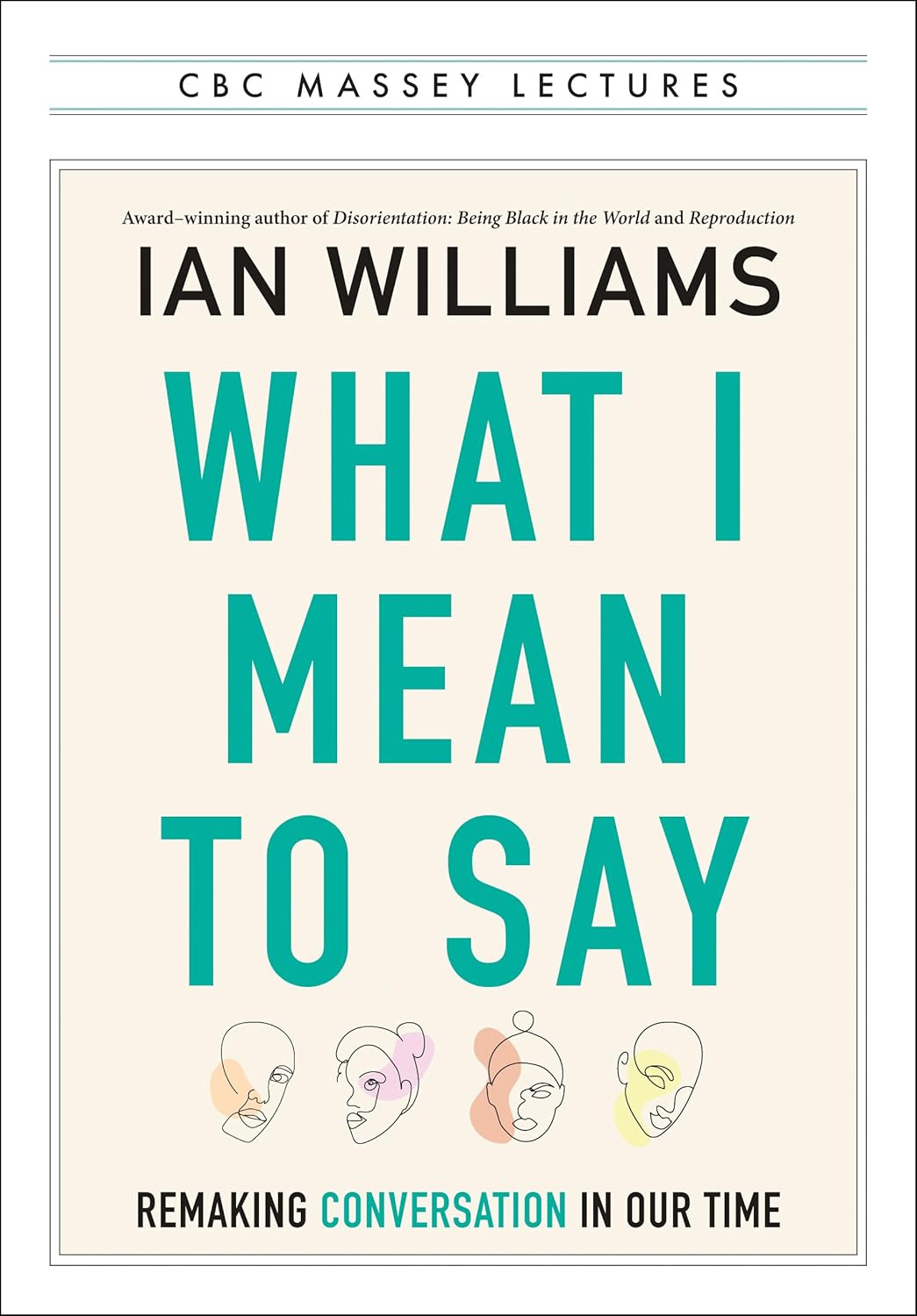What I Mean to Say: Remaking Conversation in Our Time by Ian Williams
A Review by Selena Mercuri
What resonates with me most about Ian Williams’s writing—whether fiction, nonfiction, or poetry—is his bold experimentation with form, which mirrors the complexities of human communication. What I Mean to Say, as playful as it is insightful, is no exception. In this conversation about conversations, Williams interweaves text messages, scripts, bars of sheet music, and cheeky side notes from an editor named Edna (cue joke about wanting to be Edna when I grow up). The result is a book that feels both deeply personal and profoundly universal, in which Williams extends the reader an invitation to reflect on the intricacies of their own interactions and relationships.
“In an age marked by the proliferation of social media platforms, political polarization, and censorship campaigns that ban books and silence opposing viewpoints, What I Mean to Say is a call to reevaluate how we converse.”
In an age marked by the proliferation of social media platforms, political polarization, and censorship campaigns that ban books and silence opposing viewpoints, What I Mean to Say is a call to reevaluate how we converse. What makes for good conversation? According to Williams, listening is key. We shouldn’t avoid difficult conversations just because we haven’t yet mastered the skill of listening—like a musician practicing training their ear, we should engage in conversations with the goal of becoming better listeners, rather than simply anticipating our own responses, or trying to change the other person’s opinion.
The call for better listening feels especially timely as genuine conversations are increasingly put on the back burner in favour of efficiency and surface-level exchanges. Having worked in coffee shops for nearly a decade now—largely against my will—I have seen firsthand how meaningful conversations have become increasingly rare. Williams writes, “We are in an age of conversation as slogan, as a series of talking points, regurgitations.” This observation resonates with me because, in my line of work, I often find myself rolling my eyes at exchanges like this one:
Me: Good morning.
Customer: How’re you?
Me: I’m-
Customer: I’ll take a latte.
Why even ask if you’re not going to listen to my answer or give me a chance to return the question? Such interactions often feel like a glitch in the Matrix—bizarre moments where reality is stuck on a loop, indifferent to anything I might say. These brief interactions, although seemingly insignificant, reflect a larger issue: the tendency to speak without listening, to go through the motions of communication on autopilot. Williams points out that we often talk at each other rather than with each other, and he challenges us to be more attentive and intentional, even in everyday moments that might seem insignificant.
“Before the rise of therapists, people only had their communities. We still have those, but their judgement has been called into question and the work of our hearts outsourced to professionals.” - Ian Williams
Williams’s critique of therapy and the professionalization of care is particularly thought-provoking. He writes, “Before the rise of therapists, people only had their communities. We still have those, but their judgement has been called into question and the work of our hearts outsourced to professionals.” While he acknowledges the value of therapy, he critiques how this outsourcing has sometimes become a way of sidestepping uncomfortable emotional work within our relationships. Contemporary discourse often conflates seeking help with imposing burdens, and buzzwords like ‘trauma dumping’ discourage openness while overlooking the significance of community care. Williams reminds us that setting boundaries doesn’t mean avoiding emotional vulnerability entirely, and his nuanced perspective encourages readers to reflect on how they balance personal care with their responsibilities to others.
I had the privilege of attending the launch of What I Mean to Say at the Toronto International Festival of Authors, as well as the final Massey lecture at Koerner Hall. A moment that stuck with me was Williams’s candid admission of embarrassment over the book’s conclusion. In those final pages, he addresses a close friend, expressing hurt over what he perceives as a lack of reciprocity of care in their relationship. The book ends with his heartfelt plea: “Forgive me, I’ve said too much.” It’s a strikingly vulnerable moment that underscores the importance of meaningful conversations, no matter how messy or uncomfortable, in strengthening our relationships. If anything, he’s said just enough.
About the Author
IAN WILLIAMS is the author of seven books of fiction, nonfiction, and poetry. He is the winner of the Scotiabank Giller Prize, the Danuta Gleed Literary Award, the Raymound Souster Award, and a finalist for the Griffin Poetry Prize. Williams is a professor of English at the University of Toronto, where he directs the Creative Writing program.
Book Details
Publisher : House of Anansi Press (Oct. 8 2024)
Language : English
Paperback : 248 pages
ISBN-10 : 1487013426
ISBN-13 : 978-1487013424






I love Ian Williams and am looking forward to reading this!